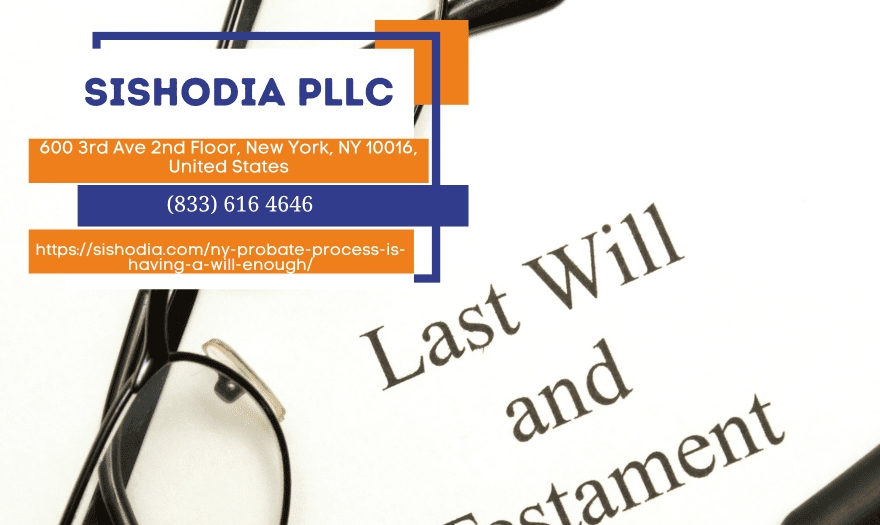The role of a Manhattan estate planning lawyer is often thought to begin and end with the creation of a will. But as Natalia A. Sishodia (https://sishodia.com/ny-probate-process-is-having-a-will-enough/) clarifies in her latest article for Sishodia PLLC, having a will alone does not guarantee that a person’s wishes will be carried out without delay or complication. The probate process in New York requires more than just a signed will, and families may still face challenges when distributing assets unless a broader estate planning strategy is put in place.
Natalia A. Sishodia, a Manhattan estate planning lawyer, points out that a will is essentially a directive rather than a mechanism for avoiding probate. “A will or testament is a legal document that expresses a person’s wishes as to how they want their property to be distributed upon their death,” she writes. But even with a properly drafted will, assets must go through the probate process before they can be distributed. This process includes debt settlement, tax filings, and court procedures that can delay or reduce what beneficiaries ultimately receive.
In the article, the Manhattan estate planning lawyer explains that probate in New York can take four to nine months or even longer, especially when disputes arise or if the estate includes real property. When real estate is part of the estate, particularly co-op apartments in New York City, the process becomes even more complicated. A co-op board’s approval is often required for transfer of ownership, and if denied, the property may have to be sold regardless of the deceased’s intentions. These delays and legal requirements can create unnecessary burdens on grieving families if proactive planning has not been completed.
According to Natalia A. Sishodia, simply relying on a will can also result in unexpected financial consequences. Creditors and tax authorities have priority during probate, which means debts and taxes are paid before any assets are distributed to heirs. In cases where the estate lacks sufficient cash, real property may need to be sold to cover outstanding obligations. This can drastically alter what beneficiaries eventually inherit.
To minimize these issues, Sishodia recommends exploring estate planning tools that allow for asset transfers outside of probate. As stated in the article, “some assets, like the proceeds from retirement accounts, proceeds of an insurance policy, a 401k and IRA, and other accounts with a named beneficiary... are not subject to the probate process and they pass to the named beneficiary or surviving tenant.” Strategies like living trusts, payable-on-death designations, and joint ownership can all help families avoid the complications of probate while ensuring timely distribution of assets.
The article also highlights common misunderstandings about what a will can and cannot control. In New York, certain types of property bypass the probate process entirely due to their structure. These include life insurance policies, retirement accounts with named beneficiaries, and jointly owned properties with survivorship rights. Even a comprehensive will cannot override the direct transfer mechanisms associated with these assets. Misalignment between a will and these asset designations can create confusion or legal disputes if not addressed properly in the estate planning process.
Natalia A. Sishodia also outlines the typical probate timeline in New York. Within the first three months, the executor must file the necessary documents with the Surrogate’s Court, notify creditors, and compile an inventory of the estate. By the sixth month, debts and taxes must be paid, and disputes should be resolved. Ideally, distribution occurs by the ninth month, but legal challenges, creditor claims, or disputes can prolong this process significantly.
She emphasizes the importance of planning beyond a will, particularly for individuals with complicated family structures or significant property holdings. A living trust, for example, can provide more control over asset distribution and help avoid probate entirely. Tools like these not only preserve the value of an estate but also reduce the emotional and financial burden on heirs.
Failing to plan for these realities can result in costly delays and unintended outcomes. Natalia A. Sishodia’s article serves as a reminder that while a will is a foundational document, it is not a complete solution. Families need to understand that true estate planning requires a holistic approach that addresses both probate and non-probate assets.
For anyone with property or financial interests in New York, considering additional estate planning measures can make a significant difference. Taking action before issues arise can streamline the transition for loved ones, maintain the value of an estate, and honor the intentions set forth by the deceased.
Contacting a Manhattan estate planning lawyer like Natalia A. Sishodia can help individuals evaluate which strategies best align with their goals. Planning today may mean fewer complications and greater security for family members tomorrow.
About Sishodia PLLC:
Sishodia PLLC provides estate planning services in New York City with a focus on helping clients preserve their assets and ease the transfer of wealth. The firm offers legal guidance on wills, trusts, probate, and other strategies to support long-term planning and reduce uncertainty for families.
Embeds:
Youtube Video: https://www.youtube.com/watch?v=2V80jXo5kbc
GMB: https://www.google.com/maps?cid=12450537318741950980
Email and website
Email: natalia@sishodialaw.com
Website: https://sishodia.com/
Media Contact
Company Name: Sishodia PLLC
Contact Person: Natalia A. Sishodia
Email:Send Email
Phone: (833) 616-4646
Address:600 3rd Ave 2nd floor
City: New York
State: New York 10016
Country: United States
Website: https://sishodia.com/

